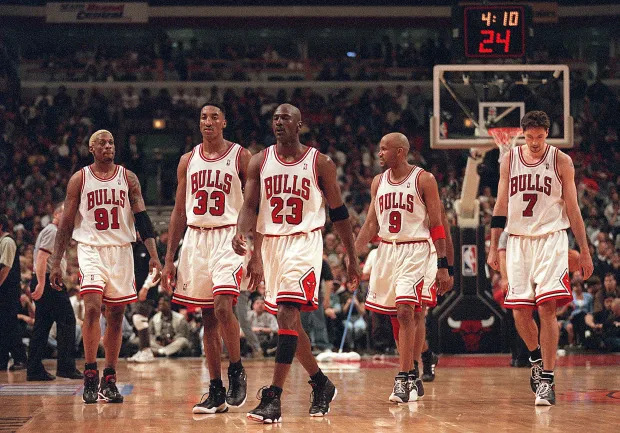
5 things to remember about the 1995-96 Chicago Bulls ahead of their Ring of Honor induction
:quality(70)/cloudfront-us-east-1.images.arcpublishing.com/tronc/M4KTNH3U5S6TWSJBTODI43GPL4.jpg)
Few teams have been more emblematic of success than the 1995-96 Chicago Bulls.
The team that won 72 regular season games and the fourth NBA title in franchise history will be enshrined in the inaugural class of the Chicago Bulls Ring of Honor this week, including celebrations at a gala on Thursday night and at halftime of Friday’s game against the Golden State Warriors.
[ [Don’t miss] Who should be selected next for the Chicago Bulls’ Ring of Honor? 5 potential choices for the future. ]
The individuals celebrated as part of the 1995-96 team this week include players Michael Jordan, Toni Kukoč, Scottie Pippen, Dennis Rodman, Randy Brown, Jud Buechler, Jason Caffey, James Edwards, Jack Haley, Ron Harper, Steve Kerr, Luc Longley, John Salley, Dickey Simpkins and Bill Wennington; coaches Phil Jackson, Tex Winter, Jim Cleamons, Erik Helland, John Paxson and Jimmy Rodgers; and front-office members Jerry Krause, Ivica Dukan, Clarence Gaines Jr., John Ligmanowski, Chip Schaefer, Jim Stack and Al Vermeil.
Take a look back at five of the most memorable moments for the 1995-96 team:
1. Making history with 72 wins.
:quality(70)/cloudfront-us-east-1.images.arcpublishing.com/tronc/PWAQ3WD7HRHKBCVIXQP5RWQQZA.jpg)
This team shattered the best regular season record previously set by the 1971-72 Los Angeles Lakers, who notched a 69-13 record. The season included an 18-game winning streak. The Bulls wrapped up the regular season with their 72nd win on April 21, 1996, a 103-93 result over the Washington Bullets. They went on to lose only three games across four playoff series before collecting the fourth NBA title in franchise history.
That regular season record has since been broken by the 2015-16 Golden State Warriors, who set a new regular season standard with 73 wins. But the mystique of the 1995-95 Chicago Bulls was maintained when the Warriors lost to the Cleveland Cavaliers in the NBA Finals, unable to pair their historic season with a title run.
With that precedent set, the 1995-96 Bulls will always stand apart as putting together the most successful season in the league’s history.
2. Michael Jordan sweeps the MVP awards.
:quality(70)/cloudfront-us-east-1.images.arcpublishing.com/tronc/REHZAU3XV6U7CHLDHZXJIHID5U.jpg)
After his shocking decision to return to the NBA at the tail end of the 1994-95 season, Jordan immediately resumed his place on the highest pedestal of the game in his first full year back on the court.
Jordan earned his fourth league MVP title after leading the league with a 30.4 points per game average, but the accolades didn’t stop there. After being selected second overall in All-Star voting behind Grant Hill, Jordan won the NBA All-Star MVP award for the second time — and the first time since 1988 — with a 20-point performance.
And fittingly, Jordan closed his triumphant return season by winning Finals MVP after averaging 30.7 points, 4.1 assists, 4.9 rebounds and 1.8 steals per game across the entire playoff series. He became the second player to ever sweep all three MVP awards after Willis Reed in 1970.
3. Dennis Rodman defends his rebounding title.
:quality(70)/cloudfront-us-east-1.images.arcpublishing.com/tronc/2LQTXN7455AJDFQSQCVJ4Z4CTI)
This new iteration of the Bulls was bolstered by the addition of Dennis Rodman, who immediately brought a new edge to the team on the boards. Rodman led the Bulls and the league with 14.9 rebounds per game in his first season with the Bulls, earning his fifth consecutive rebounding title.
Rodman was instrumental to the success of the 1995-96 team and found a new gear in Chicago. He recorded the first triple-double of his career in January 1996 and ended the season on the All-NBA Defensive First Team. Rodman dominated the boards in the Finals against the Seattle SuperSonics, notching 19 rebounds in Game 6 to help clinch the series.
“As you evaluate the series, Dennis Rodman won two basketball games,” Seattle coach George Karl said after the series concluded. “We controlled Dennis Rodman for four games, but Game 2 and tonight, he was the reason they were successful.”
4. Toni Kukoč emerges as Sixth Man of the Year.
:quality(70)/cloudfront-us-east-1.images.arcpublishing.com/tronc/ZG57PITCUJFQJKWRS5VMWADS6E)
The Bulls had to wait three years to finally cash in on their 1990 second-round draft pick. But when Toni Kukoč finally arrived in Chicago, he quickly made an impact. The Croatian star waited until 1993 to join the Bulls and was met with the disappointment of Jordan’s retirement, but he was buoyed by the star’s return in 1995.
Despite having to move out of a newly earned starting position to make room for Jordan and Rodman, Kukoč found his stride as the first man off the bench. He averaged 13.1 points, four rebounds and 3.5 assists to claim the NBA Sixth Man of the Year award. Kukoč is one of only three other players (Kevin McHale, Bill Walton and Bobby Jones) to earn the award in the same year they won an NBA title.
5. Fans pack the United Center as Bulls mania continues.
:quality(70)/cloudfront-us-east-1.images.arcpublishing.com/tronc/E2AUEOOYHBFE3C5PQFBWQRU3FI.jpg)
In Chicago, it was clear something special was happening this season. The franchise extended its home sellout streak to 437 games, which dated back to 1987 when the Bulls first began their lengthy war with the “Bad Boy” Pistons. That streak would not be broken until 2000.
Fans were immediately rewarded as the Bulls dropped only two losses at home in the entire season on their way to a fourth NBA title.
Leave a Reply